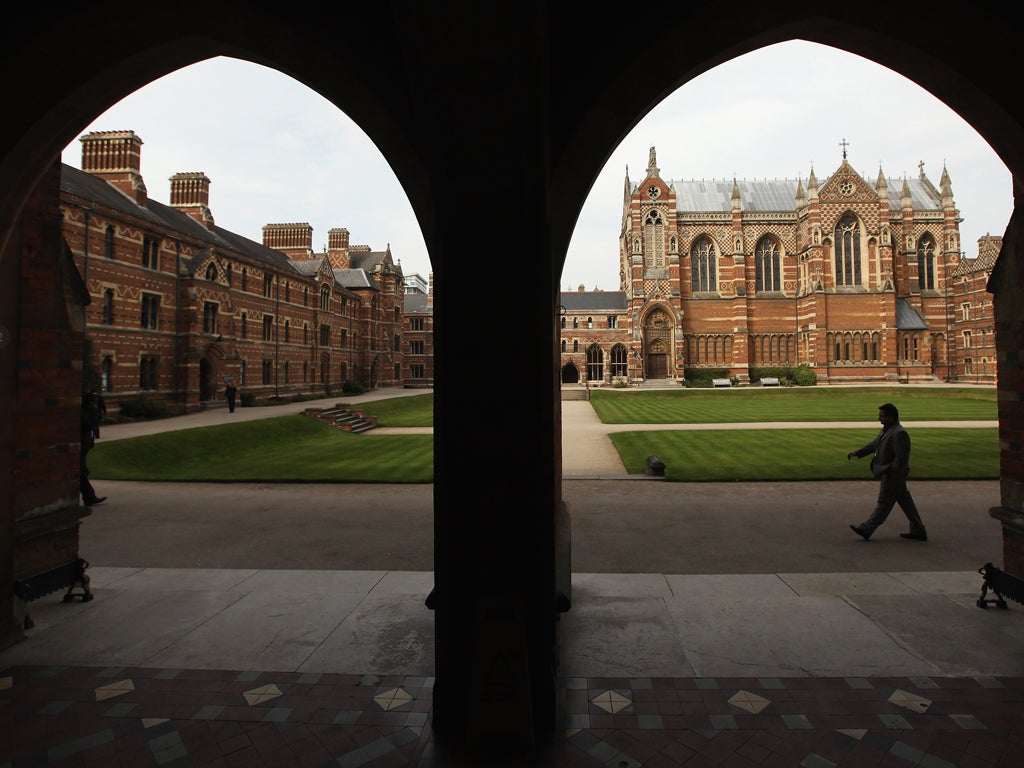The £16,000 "Oxford price-tag" will cement the university as a bastion of privilege
Raising the tuition fee cap will reduce access and turn Oxford into a university for the rich

Your support helps us to tell the story
From reproductive rights to climate change to Big Tech, The Independent is on the ground when the story is developing. Whether it's investigating the financials of Elon Musk's pro-Trump PAC or producing our latest documentary, 'The A Word', which shines a light on the American women fighting for reproductive rights, we know how important it is to parse out the facts from the messaging.
At such a critical moment in US history, we need reporters on the ground. Your donation allows us to keep sending journalists to speak to both sides of the story.
The Independent is trusted by Americans across the entire political spectrum. And unlike many other quality news outlets, we choose not to lock Americans out of our reporting and analysis with paywalls. We believe quality journalism should be available to everyone, paid for by those who can afford it.
Your support makes all the difference.The University of Oxford has a nasty habit of making headlines. So when vice-chancellor Andrew Hamilton made his annual oration to the university last week, he must have known that the content of his speech would be explosive.
The Independent would soon be running the headline “We need tuition fees of up to £16,000, says Oxford vice-chancellor Professor Andrew Hamilton”; The Mail would choose “Oxford University’s plea to charge higher tuition fees”; while student paper The Tab would go for “VC demands fees of up to £16K”, augmenting its article with an image of a be-horned Hamilton surrounded by flames and banknotes. The tuition fee debate has been opened once more.
Read more: Oxford students condemn their own vice chancellor for talk of £16,000 tuition fees
It is, to my mind, inexcusable of the vice-chancellor. Oxford already has a reputation of being a university of the privileged and wealthy, and what hope can we have of removing that stigma if the wealthy are soon to become the only ones who can afford to come here?
Even the very suggestion of raising tuition fees to the heady heights of £16,000 per annum - and that’s on top of living costs - would surely make any aspiring Oxford applicant baulk. While students from well-off backgrounds may shrug at an increase in Oxford tuition fees (fees at Harrow are already set at an alarming £33,285 per year), those who are less well-endowed would have to consider most carefully whether a place at Oxford is really worth the £48,000 a three-year course would cost them.
The argument used to suggest that Oxford somehow deserves to charge higher fees is that its world-famous tutorial system provides a better education for its students than what can be found in other universities. Prof Hamilton says the cost of an Oxford education is £16,000; if this is true, then in purely economic terms each student currently represents a loss of £7,000.
Yet we cannot look at this in purely economic terms. Students are not financial transactions, they are projects. Projects which often donate vast sums of money to their alma mater in later stages of their lives in any case, and who should not be treated as cash-cows to balance the university’s books.
To be sure, Oxford does provide a fantastic educational opportunity to those who make the most of it. As a PPEist, I receive 10 hours of contact time per week. Eight of those are lectures, which I believe to be interesting but by no means vital to academic success. The other two hours I spend in tutorials. I certainly get a lot from those two hours. Whether I get £330-worth, which is what each tutorial would roughly be worth should tuition fees increase, is questionable.
Students I have talked to about this issue have used the phrase “the marketisation of education”. It is a phrase I think sums up the situation perfectly. For Prof Hamilton to tie the university’s name to a suggestion of increasing tuition fees yet further is entirely irresponsible. Those in the higher echelons of the university organisation insist that access is of the greatest importance to them, that encouraging state school students to apply is one of their top priorities. As a former state school student I would not have considered wasting a UCAS application on an institution charging me £16,000 a year.
And in any case, Oxford University is enormously wealthy - wealthy enough to pay its vice-chancellor a yearly wage of £424,000. That would cover a year’s worth of tuition for nearly fifty students, at the current rate. Given the choice, I’d pick those fifty students over Prof Hamilton any day of the week.
Join our commenting forum
Join thought-provoking conversations, follow other Independent readers and see their replies
Comments